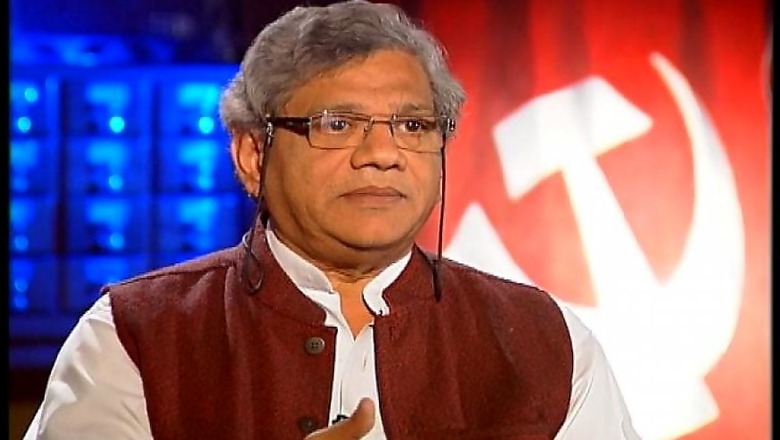
views
Francis Fukuyama’s original title for his famous essay The End of History? in the international affairs journal The National Interest had a question mark at the end. That was in 1989. Opting for certainty, he dropped the question mark and expanded the title when his book The End of History and the Last Man appeared three years later. His argument was that the end was also a beginning. The world was witnessing not just the end of the Cold War and the demise of the Soviet Union but the universal triumph of Western capitalist democracy as the ultimate form of human government. In much the same way, the disappearance of the Bengali Left from the Rajya Sabha could mark the beginning of a neo-capitalist age Indian style, which means tinged with Hindu fundamentalism and religious intolerance.
Whatever one thinks of the Left, only a rigid ideologue bordering on fascist bigotry would deny that variety is of the essence of democracy. A lal jhanda carrying communist is as much a part of India’s political landscape as a yogi in saffron and beads or another chief minister who swathes a scarf round her head. A hundred flowers must bloom in the literally truest — and not Maoist — sense if every strand of thought in the country is to find reflection in the decision-making process. India’s leaders have accepted this since 1952 when Bhupesh Gupta of the undivided Communist Party of India became the first Left candidate to the Rajya Sabha and brought a dimension of intellectual breadth and human compassion to its debates. Whether or not the denial of any representation to the Left from Bengal is because the Left is “the victim of a conspiracy” as Bengal’s Left legislature party leader, Sujan Chakraborty, believes, there is no doubt that the Rajya Sabha will be the poorer without this essential element.
Bikash Ranjan Bhattacharya, the Marxist leader whom the Election Commission rejected on what looks like flimsy procedural grounds, is a veteran politician, a qualified lawyer and a former mayor of Kolkata. His presence and participation can only have enriched the proceedings of the Upper House. It may seem pertinent in the context of the conspiracy theory that only four months ago Bhattacharya complained of being manhandled by Trinamool Congress workers who snatched his cell phone. The Left is in bad odour with the hundreds of thousands of educated, aspiring and sycophantic Indians — politicians, bureaucrats, businessmen, journalists, academics and others — who slavishly court the establishment to pick up even sour plums.
Some might say that the practical consequences of the Bengali Left being unrepresented may be minimal so far as national governance is concerned. Not only does the Rajya Sabha not play a decisive constitutional role in statecraft (although its vetoing power has put the NDA government to considerable inconvenience in the recent past) but membership is nowadays sometimes scandalously manipulated, albeit often in a good cause. Worthy man and valuable parliamentarian though he might be, the Delhi-based Sitaram Yechury was not especially representative of the cross-currents of Bengali life and thought.
Similarly, the formidable intellect of Manmohan Singh represented a national consensus that enjoyed international respect and goodwill; it didn’t reflect Assam’s exclusive ethnic and cultural identity or the social winds that blow in the Brahmaputra valley. Rajya Sabha membership was little more than a permissible flag of convenience for both.
That is not to belittle the Rajya Sabha’s functions as a scrutinizing second chamber (somewhat like Britain’s reformed House of Lords) whose veteran legislators can subject laws to dispassionate examination free of the heat and passions of party loyalties. Past history has shown that the nation’s political life has only benefited from the special talents identified with radical men and women from Bengal. One thinks of the sharp eye for corporate corruption that distinguished the CPI’s revered Gurudas Dasgupta, as well as of the academic and oratorical brilliance of Biplab Dasgupta of the CPI(M) and the no less respected university teacher, author and vice-chancellor, Bharati Ray. In a totally different field, the Left also nominated the distinguished film maker, Mrinal Sen.
These men and women were not failed political activists who had to be smuggled into the parliamentary pipeline. Nor were they party hacks who had to be rewarded. They were men of quality and ability who added lustre to the Rajya Sabha’s image and often made outstanding contributions to debates. By and large, Leftist politicians from Bengal were known for their austere lifestyle. Of course, the flock could not but throw up the occasional black sheep. It is to the credit of the Left that it did not shrink from its duty when this was spotted. The CPI(M) recently suspended for three months the tempestuous 39-year-old Ritabrata Banerjee, a former general secretary of the Students’ Federation of India whom it had sent to the Rajya Sabha. The ostensible reason for punishing him was an unbecomingly lavish lifestyle betrayed by the Mont Blanc pen and Apple watch that he is said to have sported. Mrinal Sen might chuckle that the “moral turpitude” of which Banerjee is accused recalls Ninotchka, a 1939 MGM film by producer and director Ernst Lubitsch starring the legendary Greta Garbo and Melvyn Douglas in which a stern Soviet woman sent to Paris on official business not only finds herself attracted to a man who represents everything she is supposed to detest but ultimately betrays the Cause for an elegant hat she can’t resist.
No such charge could ever have been levelled against Bhupesh Gupta, the Middle Temple barrister who began his communist career as a member of the Communist Party of Great Britain. Though their paths diverged later, he became friendly in London with Jyoti Basu, Bengal’s Marxist chief minister. A taciturn man who was hard of hearing, Gupta had been a revolutionary in East Bengal and lived in a commune. He was a sharp parliamentarian and took his duties on Parliament’s Committee on Public Undertakings extremely seriously. Once he told S.A. Dange, “You may be the chairman of the party, but I won’t allow you to interfere in the matters pertaining to parliamentary affairs. I will stick to principles and ideals according to my conscience.”
He was the longest-serving member of the Rajya Sabha, serving for more than 29 years at a stretch from the chamber’s inception to his death in Moscow on August 6, 1981. Gupta was specially felicitated when the Rajya Sabha celebrated its 100th session and 25th anniversary on June 22, 1977.
He was the last of a breed. They don’t make them anymore. A Rajya Sabha without any representative of the Left parties from Bengal for the first time ever is also an end of history. It recalls Gopal Krishna Gokhale (1866-1915) famously proclaiming, “What Bengal thinks today, India thinks tomorrow.” If Bengal has dispensed with the liberal Left today, India will probably do so tomorrow. We are edging towards political conformism and repressive uniformity.
(Mr Datta-Ray is a journalist and author of several books. He has been editor of The Statesman. Views are personal)




















Comments
0 comment